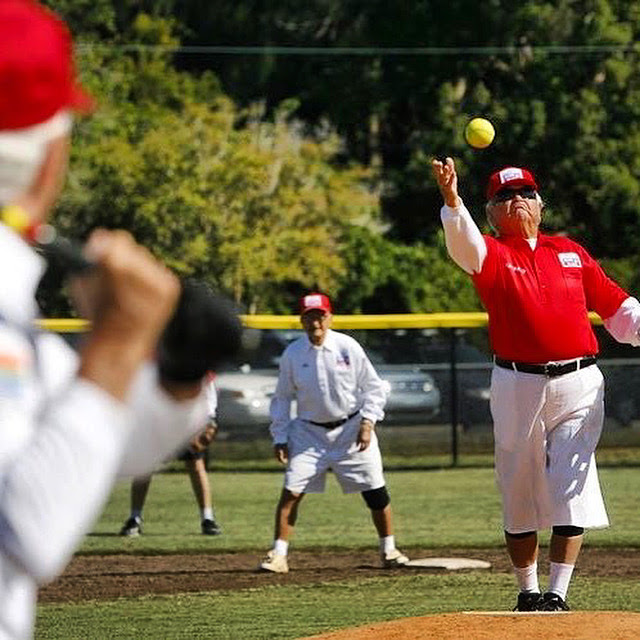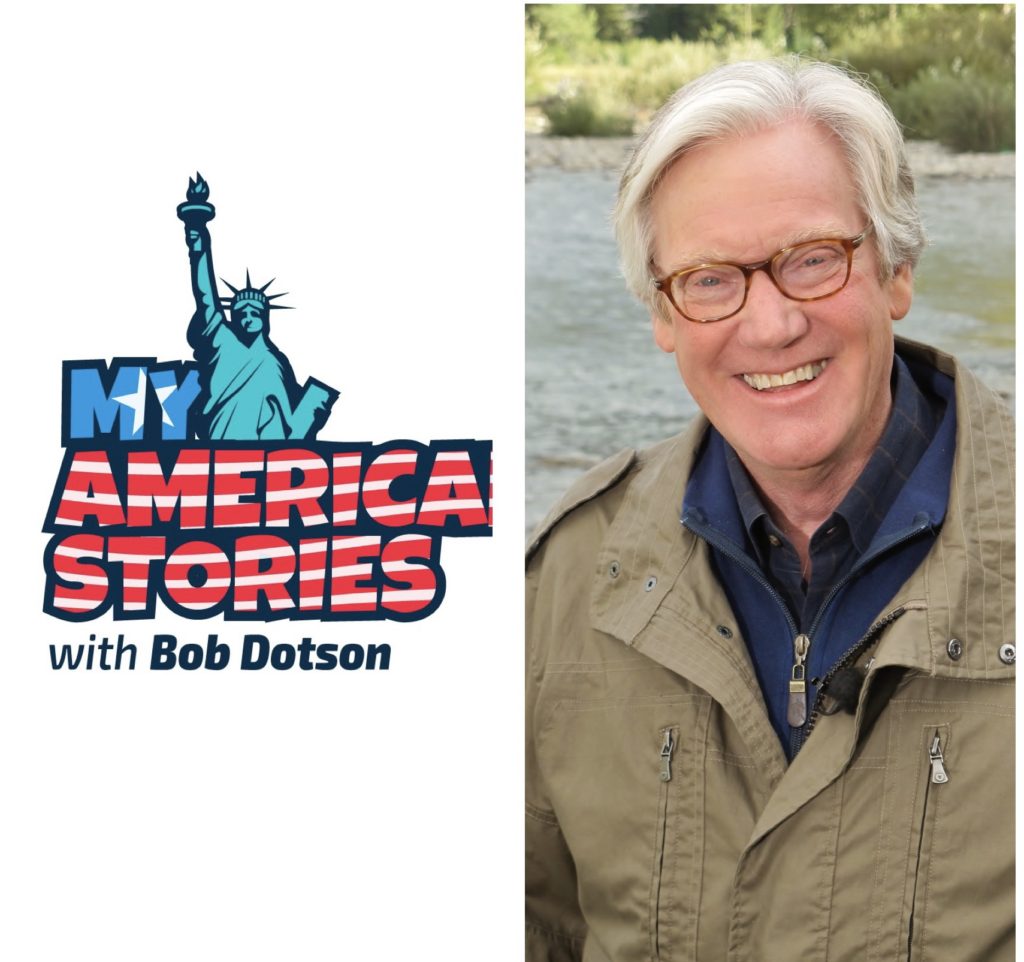Legend is a word we use easily. A team wins thirteen games – legendary. A guy tosses one good season of baseball – he’s a legend. A single Saturday afternoon thrill – legendary. But what of the legends who build quietly, year in and year out, until they touch us all. For sixty summers Jimmy Porter gently coaxed the kids of Carollton, Texas, to play the game he loved.
- Old West Humor
The west of legend has so captured our imagination that the real west is often overlooked. For nearly 30 years cowboy cartoonist Ace Reid gave voice to people we thought we know, but never asked. His cartoon series “Cowpokes” was read in Gobblers Knob, Utah and Fishtail, Montana, hundreds of small towns where cowboys still challenge a hardscrabble land.
- Pole Ferry
Growing up, I spent my summers in farm country — Kansas — with a grandfather who loved to tell stories. Perhaps that’s why I got into the storytelling business.
My grandfather told me that when he was 18, he was what used to be called “all hat and no cattle,” a kid with little money and no property.
“One of my biggest thrills,” he said, “was loading my buggy and best girl on a river ferry. That was like a ride at Disneyland. The ferryman would push us across with a pole and an encyclopedic knowledge of the currents. Quite an adventure in 1903!”
Grandpa would have loved Ashley Pillar, one of the last of those old-time river ferrymen.
- Little Dead School House
The road out of town is the only way the road seems to go. So few families remained in McLeod, North Dakota, Jan Herbranson ran out of kids at the old one-room school. Normally, that would spell the end of a place like McLeod. The school closed in 1986. But in this village of 50, four babies born. When they grew up, children returned to her little dead school house and so did Jan Herbranson.
- Castle Tooth
Each evening Dr. Mort Copenhaven drove 900 feet up the side of Camelback Mountain to his own castle. It took him 13 years to chisel his home out of a cliff. He did all the work. Mort had no formal training, but he was a dentist. Figured that building a castle on the side of a mountain wouldn’t be much different than planting a false tooth.
- Marathon Mom
Vivian White is no taller than an August cornstalk, but — at age fifty-one — she was determined to run 6,500 miles. That was the distance from her home in Illinois to her son’s front-line Army post in Iraq.
“Every mile that I jog,” she said, “brings him that much closer to being home, at least in my mind.”
Vivian logged more than a thousand of those miles in the first 6 months after Brian went to war. She had 5,500 to go. Friends quickly realized that she would need help covering that distance.
- Un-Millionaire
Mary Cowboy believes wealth should be like manure.
“The idea is to take the manure and spread it out,” she says with a grin. “It’s not good to keep all the manure in your pocket.”
But no one would lend her money to start a high tech farm in time for spring planting. Until an unlikely super hero rolled to her rescue.
- Flying Fathers
These guys were to hockey what the Harlem Globe Trotters are to basketball. Their goalie rode a horse named Penance. Their best player was a priest dressed as a nun, “Sister Mary Shooter.” She would distract the other team’s goalie by lassoing him with a twelve-foot rosary.
- Skunk Train
A redwood forest 140 miles North of San Francisco is a place so bountiful and full of peace, “Nothing around here is ever killed. It always dies of old age and cholesterol,” Juanita Dahl grins. She lives miles from the nearest highway, but not alone. Each morning, a one car train rattles up from Fort Bragg on the California coast to snatch the mail and take Jaunita to the grocery store.
- Giving Back on Block Island
Fred Benson was the most successful person I ever met. He lived on Block Island, off the coast of Rhode Island. Fred was police chief, fire chief and the state Driver’s license examiner. He was also head of the rescue squad, baseball coach, teacher, builder and President of the Chamber of Commerce. Five times. Then — he won the Rhode Island state lottery. Five hundred thousand dollars. He threw the biggest birthday party anyone could remember. Invited all the children on the island and announced he’d pay the college tuition of any child who wanted to go. Fred always thought of his community first. In the Seventies there was a housing shortage on Block Island. So, at 54, Fred went to college and got a degree. He taught high school shop. The island’s four builders got their start with Fred. He never married. Never had children. But, for 82 years, he dedicated himself to the people of Block island. Fred Benson had found a safe harbor and then showed others the way.
- Laughter Saves a City
Juan Delgadillo looked like a Shriner who had lost his parade. He cruised by my car window on a hot, dusty day west of the Grand Canyon driving an ancient convertible painted the colors of a dripping ice cream cone. It was a griddle hot morning in July, but a decorated Christmas tree stood tall in his back seat. At the top a sign read: “Follow me to Dead Chicken sandwiches.”
- Betting on a Town’s Future
Paid your taxes? Dreaming of a better way to fund government? Maybe more lotteries? Back in 1986, governments were beginning to experiment with gambling to raise money. The mayor of McClusky, North Dakota mayor bet on his town’s future. He left it to chance. Friday nights down at Elms cafe, you could find him dealing blackjack. The money he won went to charity. All of it. In four years, this village of 650 people had raised $57-thousand dollars. Gambling. Players figure they couldn’t lose. If they did, their money helped paint the town’s pool or buy a new ambulance. It had been a blessing for some, a curse for others.
- Migrant Mona Lisa Update
Florence Thompson’s picture haunted the nation. Her grandson saw the photograph hanging inside a G.I.’s tent in Vietnam. The face had been printed black and the Black soldier who owned it swore she was Black. Florence and her story had not yet been found. But that frozen moment of her life, that picture, writes its own story in each of us.
- A Hunk of Learning Love
Some of us are lucky enough to have had a great teacher. A cheerleader who changed our lives. Frank Cooper told his students something that stuck — Keep Your Promise. He said that dressed as Elvis.
- Photos of the Overlooked
When Joe Clark left home, he carried with him pictures of friends and neighbors who would set a course for his life. Joe went to work for the great news magazines, Time and Life and Newsweek, capturing the faces of common people. Seasons, like sign posts, mark the time. In the fall of his 76th year, Joe Clark decided to come back to Cumberland Gap for a harvest of memory.
- I Wouldn’t Choose Sight Follow up
27 years after my first story, artist Michael Naranjo, who lost his sight in the Vietnam War, has become a world renowned sculptor, despite his total blindness. The Native American sees more clearly than most.
- I Wouldn’t Choose Sight
Native American sculptor Michael Naranjo lost his sight during the Vietnam war. He created a 17 foot sculpture by touch.
- Starting Every Day with Nothing
No one had time for the old man squatting over a box of vegetable peelers on a New York City street corner. The crowds swirled around him on their way to work, but he didn’t seem to notice. The solitary street vendor flicked a slice of potato off his thousand-dollar suit, smiled to himself, and asked, “Why would you buy four peelers, if they last a lifetime? Because you have four friends,” Joe explained. “Never underestimate a small amount of money, gathered by hand.” For 60 years he loved the glorious uncertainty of starting every day—with nothing.
- Teen Drifter Becomes Basketball Star
Jennifer Annable was five months pregnant when she moved to Seattle with fifty-bucks in her pocket. She worked long hours, struggling to become a teacher. Eventually, she ran a school for children with special needs. Melvin Jones was one of them. He was 16, drifting on the streets of Seattle. She made up a room for him. She had already opened her home to five kids. Why would a divorced, single mom take on such a challenge?
- Farm to Fame
Chuck Taylor waved at a hawk strafing the wheat field in front of him. “There is beauty everywhere. I just want to express what I am feeling.”
He pushed up his feed company cap and began to sing louder than his farm tractor engine. Chuck’s voice boomed over that Colorado field, keeping time to the rhythm of his motor. The tractor turned into the setting sun, revealing a big man, close to three hundred pounds, haloed in the cab. Chuck Taylor was wondering why that sun wasn’t a spotlight.
TURNS OUT, IT WAS.
- Payback Painter
Bussey, Iowa may make you homesick for a place you’ve probably never been. Just 422 people lived there the day I dropped by. But this small town has made a big difference in Todd Spaur’s life. He was in a terrible accident two decades ago when his car flipped off a bridge and lay hidden in heavy underbrush for 16 hours. He could not call for help or call out because he’d broken his back, neck and most of the bones in his face. Doctors said he would never walk.
“I could wiggle one toe,” Todd says.
The town offered to look after Todd while he proved the doctors wrong. He decided to take art classes with some of the money townspeople donated to help him design a new life. The man who struggled to stand for 18 years, now dangles from a cherry picker two stories tall. He’s painting a picture of all those people who pitched in when he needed them most.
Life has taken Todd Spaur to such a dark place, perhaps it is easier for him to see beauty. The fellow with 9 steel plates in his body and a fractured hip vertebrae, has been painting this gift on the side of downtown wall for 10 painful months. In Todd’s mural you see America that was and in this place still is.
Its not just a painting. Its everybody’s story.
- A True Fairy Tale Wedding
Deborah Huddleston fell in love with Glenn Gammage. They were married out on the prairie, dreaming dreams, as if they were new. He speaks 5 languages and has circled the world with the U.S. Navy. She has seldom left Texas. They fell in love and decided to marry, never having met.
- VANISHING SILENCE
No matter how far we go into the wilderness, we can seldom escape the sounds we make. There are few places where planes do not fly or foghorns cannot pierce. Just as city lights keep us from seeing dimmer stars, these noises of every day life drown out the more delicate voices of nature. Gordon Hempton searches for spots to record the earth’s chorus — without us.
- Cultural Center of the Country
New York spends more money on the arts than other city in the country, but a lot of those dollars come from outsiders. If you subtract all that out of town money, the place that spends the most per person for culture is Bassett, Nebraska.
“Huh?” Yep.
- Lost Graves
I found myself in a forest filled with forgotten lives. Their final resting places were marked, not with names, but numbered stakes, unnoticed, until Bud Merritt stumbled upon them. He found the first of six lost graveyards at what was once the largest mental hospital in America: Milledgeville, Georgia.
- Photo Wagon
John Coffer turned his back on modern times to wander America in a wagon pulled by oxen, stopping only to take portraits with his antique camera. Coffer traveled at two and a half miles an hour for five years. 25 states. 10-thousand miles. He crisscrossed America so slowly, everywhere he went, folks joked he was a temporary resident. Coffer captured old fashioned images of modern America.
- A Selfless Man
A surveyor from Valentine, Nebraska, was charting the land of the Rio Grande. He stopped for lunch and took a nap. When he awoke, poor people had gathered to eat his scraps. That bothered Frank Ferree. It bothered him so much he sold all his land to buy food and medicine for the poor. He kept nothing for himself. For 40 years Frank Ferree fed thousands on both sides of the Rio Grande. Five Presidents of Mexico have given him gold medals. He melted them down and bought beans.
- Homesteading Class
There’s a mountain near Glenwood Springs, Colorado, the locals call “Misery Heights.” The last cowboys left there in the 1930s. It was too remote to raise horses, too cold to grow crops. Just right to teach something about life. Jack Snoble teaches a course in homesteading. Class size, one student.
- VOLUNTEER CAFE SAVES TOWN
There are a lot of little towns in farm country fighting for their lives. In Havana, North Dakota, the sun hasn’t set. When the town’s cafe went under, all 158 people in town volunteered to cook. It became something of a competition. They made $51,000, enough to open a new grocery store, build sidewalks and put an archery range. Now they dream of a jacuzzi.
- Photographer for Life
Milton Rogovin grew old watching his neighborhood grow up, sharing the yearbook of their lives. He was still photographing them at age 100, surrounded by friends who were now taking his picture — the “forgotten ones,” who did not forget him.
- Home Plate Wedding
Some folks do not see limits, only opportunities. Ed Lucas decided he wanted to broadcast baseball games, after watching the first nationally televised playoff. He ran outside to celebrate his decision. The twelve year old fired a fastball to a boyfriend with a bat.
“The ball came back and boom, hit me right between the eyes.” Destroyed his retinas. Left him totally blind.



